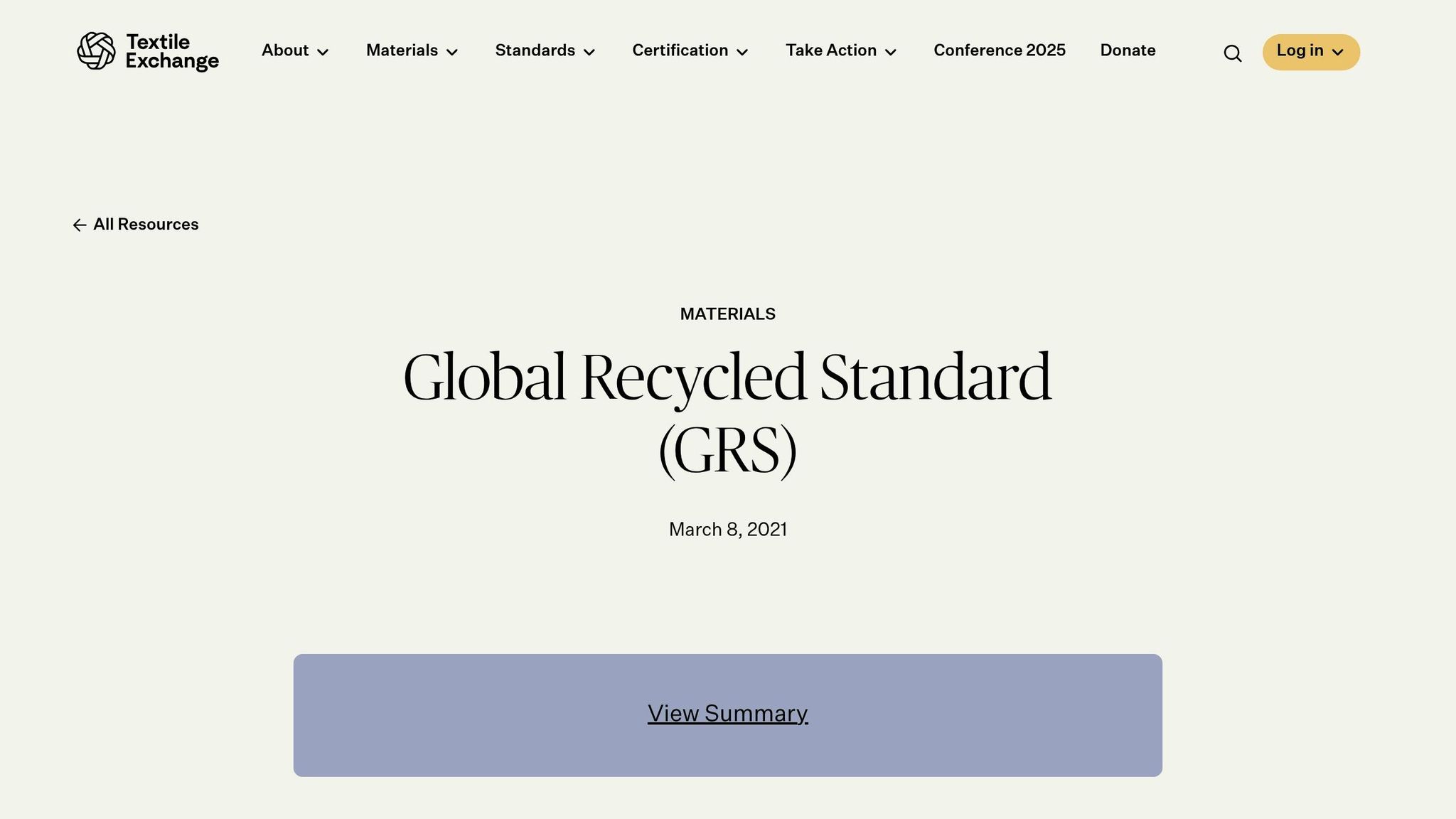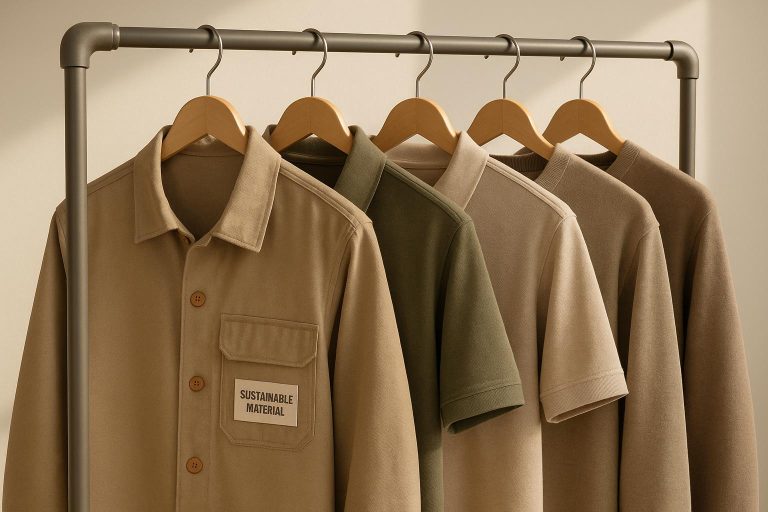In the U.S., custom team uniforms are shifting toward recycled materials and eco-conscious production. Two key certifications help verify these efforts:
- Global Recycled Standard (GRS): Covers recycled content, material tracking, chemical use, and labor conditions. Requires at least 20% recycled content.
- Recycled Claim Standard (RCS): Focuses only on verifying recycled material and tracking it through the supply chain. No minimum recycled content required.
Key takeaway: GRS offers a broader framework, while RCS is more narrowly focused. Your choice depends on your goals – whether you prioritize environmental practices or simply want recycled content verification.
Quick Comparison:
| Aspect | GRS | RCS |
|---|---|---|
| Recycled Content | Minimum 20% required | No minimum required |
| Scope | Includes labor and chemical standards | Focuses only on recycled materials |
| Certification Process | More comprehensive audits | Simpler tracking system |
Both certifications support eco-friendly goals but serve different needs. Choose GRS for a broader approach or RCS for a simpler start.
Webinar Global Recycled Standard GRS Recycled Claim Standard RCS in Action Part 1

1. Global Recycled Standard (GRS)
The Global Recycled Standard (GRS) is an internationally recognized certification designed for recycled materials in the textile industry. It evaluates the entire production process – from sourcing raw materials to delivering the final product – while emphasizing material composition and environmentally conscious practices.
Recycled Content Requirements
GRS-certified products must meet specific recycled content benchmarks. Typically, a product should contain at least 20% recycled material by weight, though many manufacturers aim for higher percentages to maximize environmental benefits. The standard allows recycled inputs from both pre-consumer waste (like manufacturing scraps) and post-consumer waste (such as discarded garments and plastic bottles).
For custom uniforms, this often means incorporating materials like recycled polyester from plastic bottles or recycled cotton. Each component of a product is assessed to ensure it contributes to reducing waste. Companies such as Wooter Apparel integrate these practices into their designs, combining sustainability with functionality.
Manufacturers are required to document the percentage and source of recycled materials at every stage of production. This transparent approach ensures clear communication about the environmental impact of the final product.
Traceability and Audits
A key aspect of GRS is its chain-of-custody system, which tracks recycled materials throughout the supply chain – from initial sourcing to the finished product. Accredited third-party certification bodies conduct regular audits to confirm that recycled materials remain intact and are not substituted during processing.
This system provides a reliable paper trail, verifying that the recycled content in the final product matches the claims made. Audits typically involve reviewing production records, inspecting facilities, and examining documentation to ensure compliance with GRS requirements.
Environmental and Chemical Standards
GRS enforces strict chemical restrictions to protect both human health and the environment. Substances like formaldehyde, heavy metals, and certain dyes are prohibited at all stages of production, from fiber processing to finishing treatments.
Certified facilities are also encouraged to adopt resource-efficient practices. These include better water and energy management, waste reduction programs, and effective wastewater treatment. Even packaging and transportation are designed to minimize environmental impact, often incorporating recyclable or biodegradable materials.
Social Responsibility
GRS goes beyond environmental practices by requiring facilities to adhere to core labor principles established by the International Labour Organization. This includes ensuring safe working conditions, fair wages, and reasonable working hours. Child labor and forced labor are strictly prohibited, and workers’ rights to collective representation are upheld.
Social compliance is verified through audits that assess workplace conditions, review employment records, and conduct confidential interviews with workers. Additionally, facilities are encouraged to engage in local community development initiatives, reinforcing their commitment to ethical and sustainable production.
These stringent criteria help ensure that custom uniforms meet high standards of sustainability and social responsibility.
2. Recycled Claim Standard (RCS)
The Recycled Claim Standard (RCS) is a specialized certification system designed to verify recycled content in textiles. It focuses specifically on confirming recycled material claims and tracking them through the supply chain, without addressing broader environmental or labor considerations.
Recycled Content Requirements
RCS is centered on verifying the use of recycled materials, making it an ideal starting point for manufacturers beginning to incorporate recycled inputs into their products. It recognizes both pre-consumer and post-consumer recycled materials, allowing flexibility in sourcing. Unlike some other standards, RCS does not enforce strict minimum thresholds for recycled content. For companies like Wooter Apparel, which produce custom athletic uniforms, this flexibility enables them to gradually incorporate recycled materials while maintaining high performance standards. The process includes detailed documentation, laying the groundwork for thorough tracking during future audits.
Traceability and Audits
A key feature of RCS is its chain-of-custody system, which ensures recycled materials are tracked from their origin to the final product. Third-party audits are conducted regularly to verify compliance. At every stage of production, manufacturers must document critical details, such as the source, type, and quantity of recycled materials used. This emphasis on transparency and accuracy simplifies the certification process for manufacturers focusing solely on recycled content verification, rather than addressing broader sustainability goals.
sbb-itb-4d95ad3
Benefits and Drawbacks
This section dives into the key benefits and limitations of GRS and RCS certifications, as outlined earlier. While both certifications play important roles in sustainability, they serve different purposes and come with their own sets of strengths and weaknesses.
GRS goes beyond verifying recycled content by also assessing factors like environmental impact, chemical management, and social criteria. However, it does have its limitations. For instance, it requires only a minimum of 20% recycled content, meaning up to 80% of the material can still be virgin. Additionally, many of its environmental criteria are based on documentation and improvement plans rather than strict performance benchmarks.
On the other hand, RCS focuses exclusively on recycled content and chain-of-custody tracking. This narrow scope allows for gradual integration of recycled materials but does not address broader issues like environmental impact, chemical use, or social considerations.
Here’s a quick comparison of the two certifications:
| Aspect | GRS | RCS |
|---|---|---|
| Scope of Verification | Includes recycled content, environmental, chemical, and social criteria | Focuses only on recycled content and chain-of-custody |
| Certification Threshold | Requires at least 20% recycled content | No specific minimum for recycled content |
It’s worth noting that recycled fibers can become shorter during processing, which can reduce durability – a critical factor for athletic uniforms. For teams that demand professional-grade performance, evaluating the quality of recycled materials is essential, regardless of the certification.
When it comes to custom uniform production, RCS might be a good starting point for organizations just beginning their sustainability efforts. Meanwhile, GRS offers a more comprehensive approach for those aiming to meet broader environmental standards. Ultimately, the choice between these certifications should align with an organization’s sustainability goals and performance requirements.
Conclusion
Deciding between GRS and RCS certifications for custom team uniforms ultimately comes down to an organization’s sustainability goals and performance requirements. For teams and manufacturers beginning their journey toward eco-friendly practices, RCS offers a straightforward way to verify recycled content and take that important first step.
For those with more ambitious environmental goals, GRS certification provides a broader framework. Beyond recycled content verification, it also addresses environmental impact, chemical management, and social responsibility. However, it’s worth noting that GRS’s minimum recycled content requirement allows for a significant portion of virgin materials, which may not fully align with stricter sustainability objectives.
It’s also important to consider the durability of recycled fibers, especially for high-contact sports like football and basketball, where uniforms must withstand significant wear and tear. Testing for quality and performance is essential in these cases.
In the U.S., many manufacturers begin with RCS certification as a foundational step toward sustainability. Those with more advanced environmental goals often pursue GRS certification, providing buyers with options that align with their specific needs. Schools and youth leagues, for instance, might find RCS-certified uniforms sufficient for their sustainability messaging, while professional teams or organizations with formal environmental policies may require the more comprehensive coverage GRS offers.
The key is to carefully balance immediate performance needs with long-term sustainability goals when selecting a certification for your uniform program.
At Wooter Apparel, we’re proud to combine high-performance standards with a commitment to sustainability, ensuring our custom uniforms meet the evolving demands of today’s teams.
FAQs
What’s the difference between the Global Recycled Standard (GRS) and the Recycled Claim Standard (RCS) for custom team uniforms?
The Global Recycled Standard (GRS) and the Recycled Claim Standard (RCS) have distinct requirements and focus areas when it comes to recycled content and overall criteria. GRS sets the bar higher, requiring at least 20% recycled content (or 50% if labeled as such) and includes additional criteria for environmental, social, and chemical processing standards. This makes it a strong choice for ensuring that uniforms are made responsibly and with sustainability in mind.
On the other hand, RCS requires a lower minimum of just 5% recycled content and is primarily concerned with verifying the presence of recycled materials. It doesn’t extend to environmental or social impact considerations. For those seeking a more thorough and ethical approach to custom uniform production, GRS offers a more comprehensive framework for eco-conscious manufacturing.
What does GRS certification mean for social responsibility and labor standards in custom uniform production?
The Global Recycled Standard (GRS) upholds social responsibility by requiring certified organizations to adhere to rigorous labor and ethical standards. These guidelines emphasize fair treatment of workers, prohibit child labor, and mandate safe working conditions. To ensure compliance, organizations undergo annual audits.
With its focus on ethical practices and worker safety, GRS certification guarantees that custom uniforms are made responsibly, meeting top-tier ethical manufacturing standards.
Why would a manufacturer choose RCS certification instead of GRS when incorporating recycled materials into their products?
Manufacturers might opt for the RCS (Recycled Claim Standard) instead of the GRS (Global Recycled Standard) because RCS zeroes in on verifying the recycled content in a product. With a minimum requirement of just 5% recycled materials, it’s a simpler certification, making it appealing for companies taking their first steps toward using recycled materials.
In contrast, GRS takes a broader approach. It mandates 20-50% recycled content and also evaluates factors like environmental impact, chemical management, and social responsibility. For manufacturers new to incorporating recycled materials, RCS can serve as a more accessible and budget-friendly starting point compared to the more demanding requirements of GRS.

